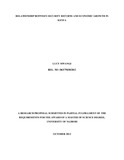| dc.contributor.author | Mwangi, Lucy | |
| dc.date.accessioned | 2013-11-13T12:26:46Z | |
| dc.date.available | 2013-11-13T12:26:46Z | |
| dc.date.issued | 2013-10 | |
| dc.identifier.citation | Mwangi,Lucy;October,2013.Relationship Between Security Returns And Economic Growth In Kenya. | en |
| dc.identifier.uri | http://erepository.uonbi.ac.ke:8080/xmlui/handle/123456789/58937 | |
| dc.description.abstract | Stock markets in the world individually and collectively play a critical role in the most national
economies. Stock prices are generally believed to be determined by some fundamental
macroeconomic variables such as interest rate, exchange rate and inflation rates. Although
growth is a major factor in poverty reduction, there is concern that growth may be inadequate to
reduce poverty substantially, hence the need to accelerate growth. To the best of the researcher’s
knowledge no study has empirically investigated the relationship between security returns and
economic growth in Kenya. As alludes to the foregoing, the causal relationship between the
security returns and economic growth in the developing countries is still a thing of controversy
particularly in the Sub-Saharan region and Kenya in particular.
The objective of this study was to determine the relationship between the security returns and
economic growth in Kenya. This research study made use of descriptive research design since it
allows collection of large amounts of data from the target population as compared to other
methods. The target population for this study constituted all the (54) companies at the NSE
which have been actively involved in the stock market trade over the last five years since they
are the ones conversant with the relationship between security returns and economic growth in
Kenya. The sample of the study constituted the NSE-20share index from the NSE. The
researcher used secondary data for obtaining necessary information for the study. The secondary
market data is available in the NSE. Using a data collection sheet, the stock price returns was
collected. The data was checked against the NSE market statistical bulletins for consistencies.
The data included security returns and Kenya’s economic growth from January 2007 to
December 2012.
The researcher used quantitative method to analyze data. The quantitative data collected was
summarized and analyzed by using cross tabulations and descriptive statistics. The results of
data analysis were presented by the use of tables to display information that was obtained from
the NSE. There is a positive and statistically significant relationship between security returns and
the continuous growth rates of GDP as such a linear dependence between the security returns and
the three independent variables namely inflation rates, exchange rates and real GDP. It was also
clear that inflation can also be increased by a drop in the value of the shilling in foreign exchange
markets. The capital markets authority should check and avert any sharp practices by market
operators (particularly the speculators) in order to safeguard the interests of shareholders. The
government through its respective specialty departments should encourage savings and
investments by putting in place appropriate policies which give equal importance to both
financial sector as well as the market-based stock market of the economy in order to enhance
capital formation and investments and consequently increasing the living standards of the people
through increased economic growth. | en |
| dc.language.iso | en | en |
| dc.publisher | University of Nairobi | en |
| dc.title | Relationship Between Security Returns and Economic Growth in Kenya | en |
| dc.type | Thesis | en |
| local.publisher | College of Humanities and Social Sciences | en |

